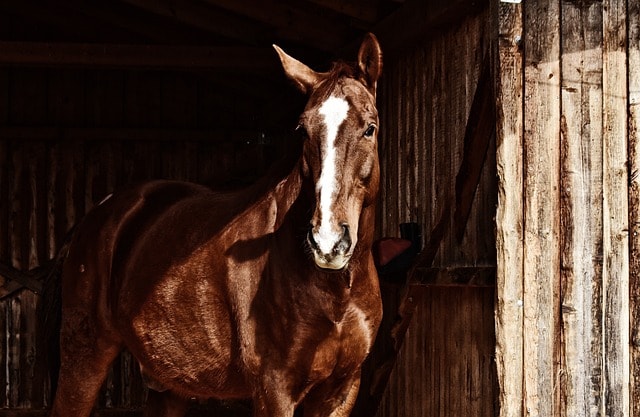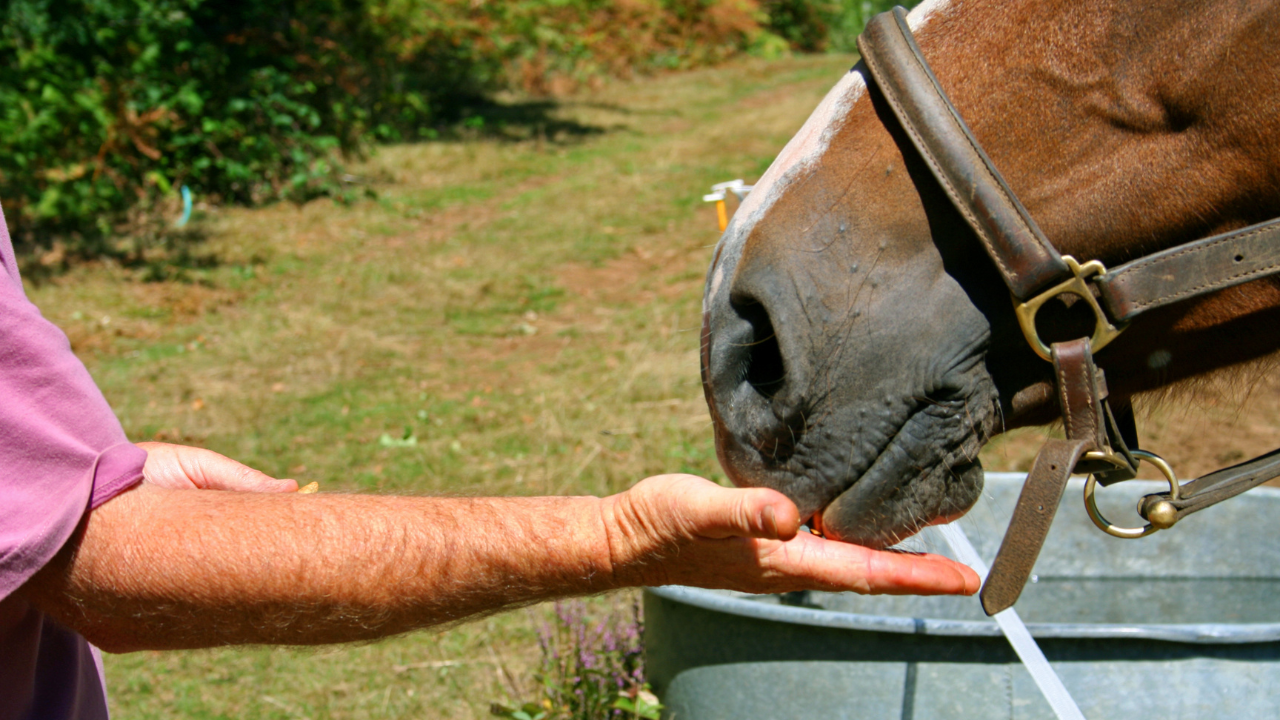Diarrhea in horses: A comprehensive guide to causes, symptoms and treatment
As a horse owner, it is crucial to keep a close eye on the health of your horse or horses. A common but often underestimated digestive disorder that can significantly affect both your horse's well-being and its quality of life is so-called diarrhea. Diarrhea in horses is a condition that is of great concern to horse health experts and horse owners alike.
In this detailed guide, we delve deeply into the topic of diarrhea and provide comprehensive information on the causes, symptoms, diagnosis and treatment options for diarrhea in horses. The following sections are not only based on proven sources, but also integrate additional content to give you the most complete overview possible of how to recognize and treat diarrhea in your horse.

What is diarrhea in horses?
Diarrhea describes a condition in which the horse passes highly liquefied feces. This condition is more than just occasional diarrhea. Diarrhea in horses is a chronic problem characterized by watery or slimy feces. Unlike acute diarrhea, diarrhea often occurs over a long period of time and can vary greatly in intensity. It can occur in phases as well as continuously. A horse suffering from diarrhea can suffer significant health impairments. The most common consequences of diarrhea and chronic diarrhea include nutritional deficiencies and dehydration, which can severely affect the horse's overall well-being. Both diarrhea and recurrent diarrhea require special attention to protect the animal's health and prevent long-term damage.
Symptoms of diarrhea in horses
To effectively treat diarrhea in your horse, it is important to recognize the symptoms:
-
Liquid or slimy stools: The stool has a very liquefied or slimy consistency. This is often a clear sign of digestive disorders.
-
Increased stool frequency: The horse has more frequent bowel movements than normal. The feces are passed at shorter intervals than usual.
-
Weight problems: Persistent diarrhea can lead to weight loss because the horse may not be able to absorb nutrients properly.
-
Behavioral changes: The horse may become irritable or restless due to the discomfort. Changes in behavior can often be an indicator of health problems.
Causes of diarrhea in horses
The causes of diarrhea are varied and can include both feeding-related and health-related factors. Here are the most common causes in detail:
1. Feeding problems
feed change
A sudden change in feed ration can put stress on the horse's digestive tract. Horses are naturally sensitive to sudden changes in their diet, so a gradual change is important to avoid digestive upset. Studies show that a slow adjustment of feed can help minimize the risk of diarrhea.
feed quality
The quality of the food has a significant impact on digestive health. Food that has been poorly stored or is of poor quality can cause problems with digestion. The most common problems include mold or high levels of sugar and starch, which can irritate the digestive tract. High-quality food provides a balanced supply of nutrients and can help prevent digestive problems.
concentrate overload
Excessive amounts of concentrate can irritate the digestive tract. Concentrates with a high sugar or starch content can cause digestive problems. It is important to adjust the feeding to suit the horse's needs and to limit the amount of concentrate to an appropriate level.

2. Lack of roughage
Roughage such as hay or straw is crucial for the digestive health of horses. It promotes the formation of manure balls and ensures even digestion. A lack of sufficient roughage can lead to irregular digestive processes and thus to watery stools. Roughage also helps to stabilize the intestinal flora, which is of great importance for digestive health.
3. Stress in the horse
Horses are very sensitive to stress, and this can have a negative impact on their digestive system. Changes in the environment, new horses or changes in daily routine can cause stress and lead to diarrhea. Stress management is therefore an important aspect of horse care. Studies show that stress can lead to an increased secretion of stress hormones, which in turn affect digestion.
4. Infections and parasites
Bacterial infections
Bacterial infections such as those caused by clostridia are known causes of diarrhea. These bacteria can cause severe digestive upset and often require targeted antibiotic therapy. It is important to identify these infections quickly and treat them accordingly.
parasite infestation
Worm infestation is another common cause of digestive problems in horses. Parasites can significantly disrupt digestion and lead to watery stools. Regular deworming is therefore crucial for the horse's health. The right worming plans and regular checks are necessary to prevent parasite infestation.
5. Diseases of the digestive tract
colic
Colic is a painful digestive disorder that can occur in horses. It can be caused by blockages, spasms, or other problems in the digestive tract. Watery stools can be a symptom of colic, and it is important to seek immediate veterinary attention if you notice any signs of colic.
stomach ulcers
Stomach ulcers are a serious condition that can cause digestive upset. They can lead to watery stools and require special treatment. Treatment for stomach ulcers may include medications to reduce stomach acid production and dietary adjustments.
Diagnosis of diarrhea in horses
Diagnosis of diarrhea is done through a combination of medical history, physical examination and laboratory tests. Here are the essential steps in detail:
1. Anamnesis
The vet will first conduct a comprehensive medical history. This includes questions about feeding, housing, possible changes in the horse's environment and previous health. A detailed medical history helps to identify possible causes of the diarrhea and to investigate them specifically.
2. Physical examination of your horse
A thorough physical examination of the horse can provide additional clues to possible health problems. The doctor will examine the horse for signs of discomfort, pain, or other abnormal symptoms. This may also include checking the horse's general health and vital signs.
3. Laboratory tests
Fecal samples from the horse are often sent for analysis to determine possible parasites, bacteria or other abnormalities. Blood tests can also be helpful in making a comprehensive diagnosis. Laboratory tests can provide accurate information about the horse's health.
Treatment options for diarrhea in horses
Treatment for diarrhea depends on the underlying cause and may involve several approaches. Here are the most common treatment strategies for diarrhea:
1. Feeding adjustments
Slow feed change from horse
A gradual change in feed is crucial to avoid overtaxing the horse's digestive tract. This helps to avoid digestive upset and minimize the risk of diarrhea. It is advisable to make changes to the feeding plan over a period of at least 7-10 days.
High-quality feed
Make sure your horse is fed high-quality feed. Avoid feed that has been improperly stored or contains poor-quality ingredients. High-quality feed helps maintain healthy digestion and can help prevent watery stools.
increasing the roughage content
Make sure your horse gets enough roughage. Roughage such as hay or straw is essential for healthy digestion and helps to minimize the risk of diarrhea. The roughage portion should be at least 1-1.5% of the horse's body weight.
2. Stress management
Stable environment
Reduce stress factors by creating a stable and calm environment for your horse. Stress can affect digestion and lead to diarrhea. A familiar environment and regular routines will help reduce your horse's stress levels.
Sufficient exercise
Regular exercise is important for your horse's general health and can help reduce stress. A daily exercise session, such as riding or free running, not only supports physical fitness but also digestive health.

3. Drug treatment for diarrhea
If a bacterial infection or parasitic infestation is the cause, antibiotics or deworming medication may be necessary. These should only be administered after consulting a veterinarian to ensure the correct dosage and duration of treatment. It is important to administer all medications according to the veterinarian's recommendations to ensure complete healing.
4. Probiotics and prebiotics
Probiotic and prebiotic supplements can help support digestive health and restore the balance of the intestinal flora. These supplements promote the growth of healthy intestinal bacteria and help to stabilize the intestinal flora, which effectively supports the digestive processes. Regular administration of probiotics can help reduce the risk of diarrhea by strengthening the intestinal flora and improving digestion. A healthy intestinal flora is crucial for the horse's general well-being and plays a major role in preventing digestive disorders.
Prevention of diarrhea in horses
Prevention is the key to avoiding diarrhea. Here are some proven prevention tips:
1. Stable feeding habits
Continuous feed ration
Avoid sudden changes in the feed ration and keep feeding times consistent. Consistent and continuous feeding helps to stabilize your horse's digestive tract and prevent digestive problems.
High roughage content
Make sure your horse gets enough roughage. Roughage ensures healthy digestion and contributes to the formation of solid fecal balls. A high roughage content can help prevent watery stools and support digestive health.
2. Stress management
Stable posture
Avoid frequent changes in the stable or among other horses. A stable and familiar environment helps reduce stress and supports your horse's digestive health.
Regular exercise
Make sure your horse has plenty of opportunities to exercise. Regular exercise helps reduce stress and promotes healthy digestion. A daily exercise session is important for your horse's well-being.
3. Regular checks
veterinary examinations
Have your horse examined regularly by a veterinarian to detect potential health problems early. Regular examinations help treat digestive disorders and other health problems early.
worming treatment
Make sure to deworm regularly according to your veterinarian's recommendations. Regular worming treatments are important to minimize the risk of parasite infestation and digestive disorders. A targeted worming strategy helps maintain your horse's health.
What to do if your horse continues to have diarrhea?
If your horse's diarrhea persists or worsens despite all measures, it is important to act quickly. Contact a veterinarian immediately for a comprehensive examination and diagnosis. Your veterinarian will be able to rule out any possible serious health problems and initiate appropriate therapy. It is important to closely monitor all symptoms and provide the veterinarian with all relevant information.
Additional measures and considerations
In addition to the measures listed above, there are additional considerations you can take into account to support your horse’s health:
1. Environmental hygiene
A clean and hygienic environment can help prevent digestive problems. Make sure the stable and pasture are cleaned regularly to minimize the risk of infections and other health problems.
2. Monitoring water intake
Adequate water intake is crucial for digestive health. Monitor your horse's water intake and ensure that fresh, clean water is always available. Adequate hydration aids digestion and can help prevent watery stools.
3. Observation of changes in behavior
Regularly observe your horse's behavior and general condition. Changes in behavior, such as restlessness or loss of appetite, can indicate health problems and should not be ignored. Early detection of symptoms can help prevent serious health problems.
4. Collaboration with experts
If necessary, consult feeding experts or nutritionists to develop a customized feeding strategy for your horse. Experts can help you find the optimal diet and feeding strategy to avoid diarrhea and other digestive problems.
Conclusion on diarrhea in horses
Diarrhea in horses is a complex and often underestimated problem that can be traced back to a variety of causes. The correct diagnosis and appropriate solutions are crucial to ensure the well-being of your animal and prevent serious health problems. Diarrhea not only affects short-term digestion, but can have a lasting impact on the entire digestive system, especially the intestines. It is more than just a temporary disorder, as it is often associated with the loss of fluids and nutrients.
Firstly, the causes of diarrhea are varied and range from feeding-related problems, such as a sudden change in feed or overloading with concentrates, to health and stress-related factors. A lack of high-quality roughage can be a significant problem, as horses rely on a high-fibre diet to keep their intestines healthy. Stress caused by changes in the environment or inadequate hygienic conditions in the stable can also lead to diarrhea. Bacterial infections, parasitic infestations and other intestinal diseases can also trigger diarrhea. Such problems require targeted solutions that address the individual needs of the horse.
Second, careful observation of the symptoms of diarrhea is essential in order to intervene in time. Typical symptoms include watery or slimy stools, often accompanied by increased fluid, as well as increased stool frequency and weight fluctuations. Behavioral changes such as restlessness or reduced interest in food can also indicate diarrhea. Recognizing these symptoms early is crucial to prevent serious health problems. A comprehensive examination can help determine the exact cause of diarrhea and find the right solutions for the affected horse.
Third, the treatment of diarrhea should always be based on the underlying cause. If the diarrhea is caused by feeding errors or an unbalanced diet, it is necessary to adjust the feeding accordingly to relieve the intestine. Stress management is also important, as stress-free horses are less prone to digestive problems. If medical treatment is required, the use of probiotics can help to stabilize the disturbed intestinal flora and relieve symptoms. A healthy intestine is crucial for the horse's well-being and appropriate solutions such as an adapted diet can help to prevent diarrhea in the long term.
Fourth, prevention of diarrhea plays a key role in preventing the occurrence of this digestive disorder in the future. A stable and balanced diet rich in roughage helps to support intestinal health and minimize the risk of diarrhea. Regular health checks help to identify potential problems early and take appropriate solutions before symptoms worsen. Stress reduction is also of great importance, as stress-free horses are less prone to diarrhea and other digestive problems.
Finally, if diarrhea persists or worsens despite all efforts, it is important to act quickly. In such cases, comprehensive solutions must be found to stabilize digestion and restore balance to the horse's intestines. Expert support may be necessary to start appropriate therapy and improve the horse's digestion in the long term. Particularly in cases of persistent fluid loss, care must be taken to ensure that the horse remains sufficiently hydrated.
Overall, managing diarrhea in horses requires patience and careful observation of symptoms. Early diagnosis is crucial to prevent long-term damage to the gut and digestion. By taking proactive solutions, such as adjusting diet and reducing stress, you can improve your horse's well-being and effectively prevent diarrhea. A healthy gut is crucial to overall well-being and by providing proper care and attention, you can ensure your horse benefits from a stable digestive system and good health.

